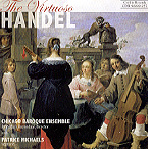This is certainly a pleasant enough Handel program–a kind of mixed bag of chamber music both for instruments and for solo voice. Two of the pieces, arias from the operas Atalanta and Admeto, exemplify the contemporary practice of transcribing popular vocal solos for other instruments–in this case flute and strings. Another, from Floridante, is presented here in a transcription for harpsichord. Flutist Anita Miller-Rieder displays a warm, inviting tone that’s easy on the ear and brings us close to the expressive qualities of the melodies’ vocal origins. The most substantial part of the disc features soprano Patrice Michaels in three of Handel’s many Italian cantatas. If you’ve heard today’s top singers of such repertoire–Emma Kirkby or Dorothea Röschmann, for instance–then you’ll be struck here by the contrast with Michaels’ technically proficient but interpretively cautious, uninvolving performances. She sings the notes but the lines lack dramatic drive and energy. Yes, she does dash off some impressive runs (the recitative “Ah! che ancor nel abisso”, for instance), but in other places (the opening recitative of the cantata Un’ alma inamorata and the following aria; the aria “Chi rapì la pace al core?”) she’s just too careful and nearly characterless. In these pieces, it’s all up to the singer to take over the stage and command our attention, and only occasionally does Michaels’ singing live up to the “virtuoso” in the disc’s title. And, as in the above-mentioned “Chi rapì” she doesn’t always get the necessary assistance from her instrumental partners; the playing there is as tentative as the singing.
The disc’s highlight is the Sonata in C for viola da gamba and harpsichord. Here we find not only a technically brilliant reading from the gamba soloist, whose tone and phrasing in the slow movements are reminiscent of a singer’s, but also real symbiotic interaction between the two players. Michaels comes more to life in the cantata La Lucrezia, although some of the more difficult jumps in the aria “Il suol che preme” lack the stamp of confidence. It’s only fair to say that the musicians are not dealing with Handel’s best material here–you won’t find many of his trademark finely turned melodies or most invigorating dramatic efforts at play in these selections, which only makes you wonder, with more inspiring music would these performers have shone more brightly? The sound is Cedille’s characteristically clear, detailed, natural staging.
































